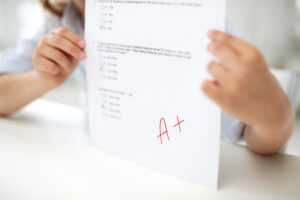More states lower testing standards in response to dismal student performance since COVID-19
As more public school students have been failing achievement tests since the COVID-19 pandemic, an increasing number of states have decided to lower the bar on testing altogether.
This tactic…

As more public school students have been failing achievement tests since the COVID-19 pandemic, an increasing number of states have decided to lower the bar on testing altogether.
This tactic “sends a message that we are accepting post-pandemic levels for student performance and shows a lack of belief in every student,” said Quinton Klabon, senior research director for the Institute for Reforming Government.
The 74, a nonprofit news organization, has researched these changes to test standards in Wisconsin, Oklahoma, Alaska and New York, noting “Illinois and Colorado are considering such revisions” as well.
“States that have been more ambitious are now sticking out like sore thumbs,” Klabon explained. “It’s kind of a race to the bare minimum, rather than a race to the top.”
‘Honesty gap’
Changing performance measures at this time only adds to the upheaval caused by COVID-19 lockdowns, said Tom Kane, an economist and Walter H. Gale Professor of Education at the Harvard Graduate School of Education.
“Many parents are already underestimating the degree to which their children are lagging behind. Lowering the proficiency cuts now will mislead them further.”
Critics of these changing test standards sometimes refer to the “honesty gap” – the difference between “disparate, conflicting measures” used by states, and “the more rigorous, uniform standard for proficiency set by the National Assessment of Educational Progress.”
Lesley Muldoon is executive director of the National Assessment Governing Board, which oversees NAEP and sets policy for it. She called the NAEP “the only common yardstick that is available to compare student achievement across states and across the large urban districts.”
“From the board’s perspective, standards are not going to be lower for [kids] when they enter college or the world of work,” she said.
Reducing test standards can hinder students from accessing resources to improve their academic performance, according to Christy Hovanetz, a senior policy fellow at the think tank ExcelinEd.
“These assessments are how we help identify students for extra support and assistance. Now there will be a lot of kids that aren’t going to be getting those high-dosage tutoring sessions or who aren’t going to be getting that additional support in math that they might need.”
Parents such as Ashara Baker, state director of the National Parents Union, are leading the way in calling for a different approach.
Baker has created her own report on student outcomes in New York, using NAEP proficiency rates as a comparison to state data based on race and ethnicity.
“The data paints a profoundly sobering picture of the academic gaps for students from different ethnic and racial groups, students who are neurodiverse and/or have disabilities, and those from families facing economic hardship,” the report concludes.
“The academic achievement gap predicts gaps in what researchers call ‘life outcomes’ – long-term health and overall wellbeing, economic mobility, employment, and incarceration rates. This is both a state and national disgrace.”
Baker calls for New York to provide more transparency to parents about their children’s academic needs: “Without up-to-date performance data, parents are missing the critical information necessary to understand how schools are supporting their students, both in K12 and as they prepare for college or career after high school.”
‘I don’t understand it – so how are parents supposed to understand this?’
Honest and even critical assessments help students and their families pinpoint areas where they need to improve, according to Baker.
“When you’re lowering these cut scores, clearly the goal is to show some sort of growth. But I think we’re getting away from the actual goal of why we do assessments. They should really demonstrate where kids are struggling or where there is a gap.”
Jill Underly, State Superintendent of Public Instruction in Wisconsin, has expressed similar frustrations with changing test standards.
When shown a report using recalibrated metrics for student achievement, Underly wanted “to make sure we’re not throwing more fuel onto this fire” in a June 2023 email to staff, obtained through a public records request and shared with The 74.
“The crummy thing is, I am an educator and I don’t understand it – so how are parents supposed to understand this too?” she asked of the report.
“For example, what does Proficient mean vs. Advanced? That they are at grade level vs. the next grade level? I just hate this stuff so much.”



